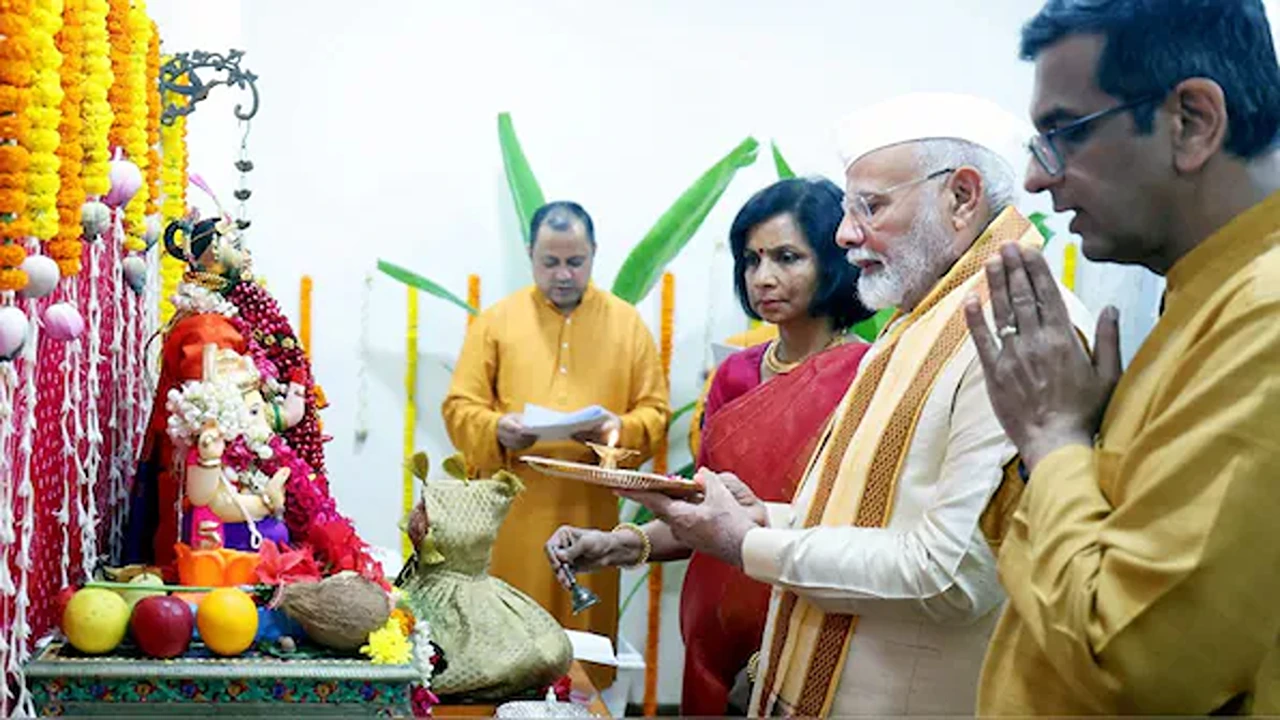
“Congress Angry Because I Attended Ganesh Puja”: PM Modi Addresses Controversy Over CJI Visit
“Congress Angry Because I Attended Ganesh Puja”: PM Modi Addresses Controversy Over CJI Visit
Best Casino – In a recent statement, Congress Angry Becaus Prime Minister Narendra Modi remarked, “Congress is angry because I attended Ganesh Puja.” This comment emerged during a controversy surrounding his visit to Chief Justice of India (CJI) D.Y. Chandrachud’s residence for festival celebrations. This incident raises questions about the intersections of politics, religion, and the judiciary in India, highlighting the complexities of governance in an “Entertainment City” filled with political drama.
The Background of the Controversy
A Cultural Festival and Political Ramifications
Ganesh Chaturthi is a major Hindu festival celebrated Birthday Bonus across India. It symbolizes the arrival of Lord Ganesha and features vibrant processions, community gatherings, and cultural displays. Modi’s attendance at the CJI’s residence aimed to promote communal harmony and showcase India’s cultural diversity.
However, his visit quickly drew criticism from opposition parties, especially the Congress. They expressed concerns about the appropriateness of a Prime Minister attending a religious event at the home of the highest-ranking judge. This critique highlighted fears about the potential blurring of lines between governance and religious affiliations.
The Political Fallout
The Congress party swiftly voiced its disapproval. Party leaders argued that Modi’s presence at a religious function in a judicial context could lead to perceived favoritism and undermine judicial independence. Analysts echoed these concerns, fearing that such actions might harm public perception of the judiciary.
In response, PM Modi defended his actions, insisting that participation in cultural events should not be politicized. He emphasized that festivals are integral to Indian culture and should be celebrated collectively, irrespective of political divides.
PM Modi’s Response: A Call for Unity
Emphasizing Cultural Significance
During his address, PM Modi stressed that attending Congress Angry Becaus cultural events like Ganesh Puja should promote unity rather than serve as a point of contention. He stated, “I am proud to be part of our rich cultural heritage, and festivals are a time for all of us to come together.”
This statement reflects Modi’s broader narrative of promoting national identity rooted in cultural traditions. By participating in such events, he aims to connect with citizens personally and reinforce his image as a leader who values Indian culture.
Navigating Political Challenges Congress Angry Becaus
While Modi’s comments resonate with many supporters, they pose challenges. Critics argue that such actions could foster perceptions of partisanship, especially in a politically charged atmosphere. The balancing act between celebrating culture and maintaining the secular nature of governance requires careful navigation.
Public Reaction: Divided Opinions
Supporters Rallying Around Modi
Many of PM Modi’s supporters praised his participation Entertainment City in the Ganesh Puja. They view it as a demonstration of his commitment to Indian traditions. For them, Modi’s visit symbolizes a departure from the often divisive politics seen in recent years.
Critics Raising Concerns
Conversely, critics raised alarms about the implications of such actions on the independence of the judiciary. They argue that the Prime Minister’s participation in religious functions with key judicial figures could create conflicts of interest. This apprehension grows in a climate where the integrity of institutions is frequently debated.
The Broader Context: Politics, Religion, and Governance
A Historical Perspective
The relationship between politics and religion in India is complex. Historically, leaders from various parties have used cultural and religious sentiments to connect with voters. However, the fine line between respecting religious practices and potential political exploitation remains contentious.
Modi’s actions reflect this trend. By actively engaging in religious festivals, he seeks to strengthen his connection with the Hindu electorate, a demographic that forms a substantial part of his political base.
The Role of the Judiciary
The independence of the judiciary is crucial for democracy. Any perceived encroachment by political leaders can erode public trust. Therefore, the implications of Modi’s visit extend beyond cultural discussions; they touch upon the fundamental principles of governance and the rule of law.
In recent years, the judiciary has faced increasing scrutiny, with debates around its role in various political controversies. Maintaining a clear boundary between political engagement and judicial independence is vital for preserving democratic integrity.
Conclusion: A Cultural Touchstone in Political Discourse
PM Modi’s remarks regarding the Congress’s response to his attendance at Ganesh Puja reflect the ongoing tensions between politics and culture in India. While the Prime Minister aims to celebrate India’s rich cultural heritage, the criticisms highlight the challenges of navigating a diverse and often polarized political landscape.
As the nation grapples with these complex issues, the discourse surrounding this incident serves as a reminder of the intricate interplay between religion, governance, and public perception. In the “Entertainment City” of Indian politics, every gesture—whether it be a festive celebration or a policy decision—can reverberate far beyond its immediate context, shaping narratives and influencing future engagements.
Moving forward, leaders must consider the implications App Download of their actions within the broader framework of democratic principles. Balancing cultural engagement with a commitment to secular governance will be key in fostering an inclusive and unified society. In this ever-evolving political drama, the stakes remain high, and the dialogue continues.
